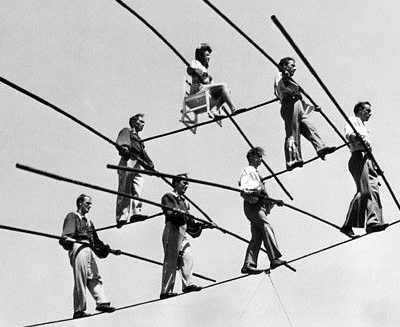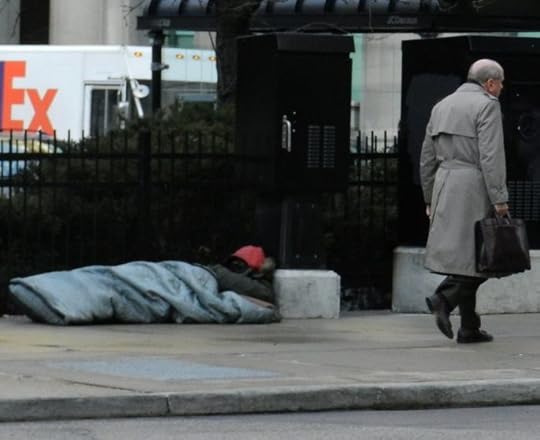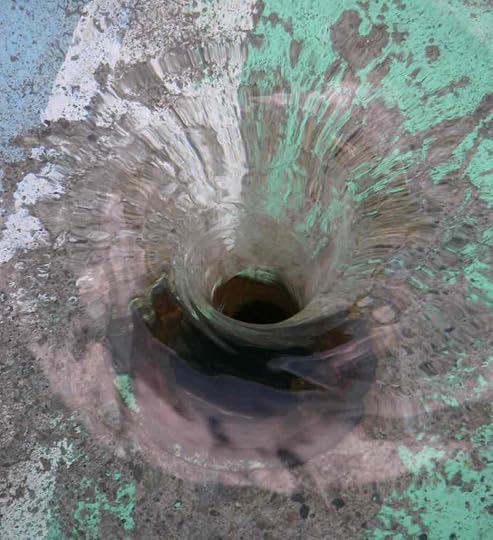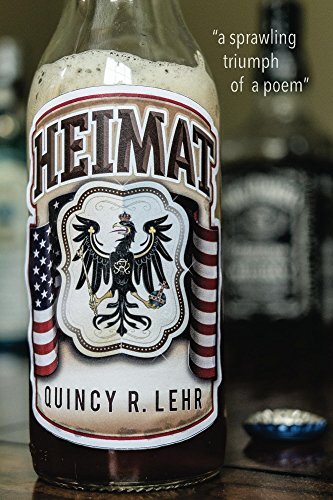Robin Helweg-Larsen's Blog, page 51
December 21, 2022
George Simmers, ‘Leonard’

Old Leonard said it straight: ‘Let’s not pretend
That death is anything except the end.
You die, you’re done; you’re fed to flames or worms.’
He’d make his point in no uncertain terms,
And Jess recalls the loud and booming laughter
With which he greeted talk of the hereafter.
‘The here and now is all that we have got;
It’s real; the vicar’s fairytales are not.’
She thinks of how he’d neatly phrase a joke;
She clearly hears the forceful way he spoke,
And that ‘Oh but surely…’, with a dying fall
Which clinched an argument once and for all
His words come back to her today as clear
As if the ancient atheist was here.
It’s just as though he’s with her in the room
Though he’s spent years now mouldering in his tomb.
She smiles to think of him, and smiles again
To think how he’s a fixture in her brain.
She even caught herself the other day
Clinching her point in just old Leonard’s way,
With ‘Oh but surely…’ Should she then infer
A trace of him is still alive in her?
Well — a man of such large humour and such drive —
Why be surprised if something should survive?
Now, ten years on, Jess too is dead and gone,
But some things have a way of lingering on.
That ‘Oh but surely…’ with that intonation
Has somehow reached another generation.
Jane, Jess’s daughter, last week floored the board
Of the college with it, and so neatly scored
Her point that they in unison agreed
To fund her project. Phrasing’s what you need,
And Jane knows that, but what she doesn’t know,
Is that trick came from Leonard long ago,
And Leonard learned it many years before
From his Latin teacher. So, how many more
Homes will this little trick of speaking find
As it nips cleverly from mind to mind?
Though death is death, and funerals are for tears,
Some things can oddly echo through the years.
*****
George Simmers has written many poems “about people dealing with what life has given them, for better or for worse.” Fifteen of them are collected in his book ‘Old, Old’, though this poem is not among them nor in his earlier and more diverse collection ‘Old and Bookish’. Instead it is from a selection he is mailing out as a sort of Christmas card this year; I’m happy to share it more widely.
George Simmers used to be a teacher; now he spends much of his time researching literature written during and after the First World War. He has edited Snakeskin since 1995. It is probably the oldest-established poetry zine on the Internet. His work appears in several Potcake Chapbooks.
https://greatwarfiction.wordpress.com/
http://www.snakeskinpoetry.co.uk/
Photo: “Danger of Death By Failing” by AlmazUK is licensed under CC BY-NC-SA 2.0.
December 19, 2022
Sonnet: ‘Visiting Earth’ (from the series ‘Voices From The Future’)

I like to visit Earth sometimes; I find
the too-brief lives and simple cares a change
from the infinities in which we range,
we who now live unbodied in vast Mind.
I love to watch the children at a zoo,
careering up and down, shrieking to see
the strange lives in the weird captivity
they also share…and as their parents do.
Visiting in – of course – a human guise,
I can be young or old, female or male;
sex, power, seduction never seem to stale,
to give gifts seems fair pay for all my lies.
Sailors and tourists visit and then leave;
it’s best their hosts have something to believe.
*****
This sonnet was published in the current Alchemy Spoon, which had ‘Gift’ as its theme. It is one of a series of ‘Voices From The Future’ sonnets which I wrote in an attempt to present more diversity than the bleakness that Maryann Corbett had identified in my writing of what I see coming. Others are ‘Ultimate Control’ (Pulsebeat), ‘Exiled Leader’ (Star*Line) and ‘Dreaming of Flying’ (unpublished). Well, some people may find them all bleak, in the same way that Victorians would have found a description of today to be bleak; but what with travel, the Internet, dentistry… I’d rather be alive now than in the past. Similarly, I look forward to the future, no matter how much change is involved.
“London Zoo, Human Exhibit” by fhwrdh is licensed under CC BY 2.0.
December 17, 2022
Ed Shacklee, ‘I Think Continually Of Men Dressed As Catherine The Great’

I think continually of men dressed as Catherine the Great,
Betty Boop or Greta Garbo, queens of film and state
who hitched their wagons to a star and switched the sex of Fate.
I think of fervid men in furs, the Humphries and the Dannies,
those lads who walked the walk in highest heels and padded fannies
and promenaded on the stage with debutantes and grannies –
the young, the old, the gayly bold who sashayed with panache
through droll burlesque or discotheques and made a spangled splash
in rainbow-hued ensembles that, while loud, would never clash.
They shaved and plucked, then nipped and tucked, ignoring boring foes
whose morals lagged while knuckles dragged around their unclipped toes.
These Joans – both Crawford and of Arc – and Marilyn Monroes
were kicked for kicks and picked upon, but got back up again;
and whether they were women inside men, or simply men
who liked to paint their nails and put on lipstick now and then,
I think continually of those whose vampy, cutting wit
and campy fame enflamed, then tamed, the bigot and the twit,
who were hammered till they stammered by their glamour and their grit
until a world a size too small became the perfect fit.
*****
This poem by Ed Shacklee, with its reference to Stephen Spender’s ‘I think continually of those who were truly great‘, was published in the current issue of Lighten Up Online.
Ed Shacklee lives on a boat in the Potomac River. His first collection, “The Blind Loon: A Bestiary,” was published by Able Muse Press.
And for those who like odd information and representations of animals, The Blind Loon: A Bestiary Facebook group is worth joining.
Photo: “Men in Drag” by jacki-dee is licensed under CC BY-NC-ND 2.0.
December 14, 2022
Marcus Bales, ‘Me and the Moon’

Her presence was the organizing spice
that made the dish; the multivalent pun;
the compliment whose humor takes you twice
as far aback in unexpected fun,
her laughter tinkling like a scoop of ice
cubes thrown on glass bottles in the sun
that heats a summer vacation afternoon.
This morning though it’s only me and the moon.
Me and the distant moon, who’s not as far
away as she and I have now become.
She laughs that laugh while I sit in this bar
and wonder how I could have been so dumb
to leave where all the things I value are
and vanish in this alcoholic slum,
regretting what I’ve kept and what I’ve strewn
this morning when it’s only me and the moon.
And now the moon is pretty far advanced
along its ambit’s arc above this place
where one is propositioned, not romanced,
and conversation lacks both wit and grace.
I shuffle now where once I might have danced
and face the fact that this is what I face,
however jaded or inopportune,
this morning while it’s only me and the moon.
L’envoi
Barman! Bring another tinkling glass
or two, and we will claim that we’re immune
to all this pitiful alas alas
this morning, you, and me, and the goddamned moon.
*****
Marcus Bales writes: ” ‘Me and the Moon’ was prompted by Cleveland singer-songwriter Alex Bevan’s post on Facebook back in the oughties, I think. He posted early in the morning that he was looking out the window at the dark and reflecting on his life, thinking that it was just ‘me and the moon’. He’s happily married, and so am I, but the poignance of the phrase somehow seemed significant, and I instantly absconded with his idea. As I recall, the poem was pretty quickly written because however happy we may now be, we all have regrets or unhappinesses to remember. I’ve never been much into the bar life but at the time my wife and I had discovered a wine bar we liked to hang out at where we knew the bartender, and I was eased into just going to the bar to chill and observe and listen. Of course Western culture is soaked in alcohol, but I had not been. It was interesting to see how the whole thing worked — and didn’t work.”
Not much is known about Marcus Bales except that he lives and works in Cleveland, Ohio, and that his work has not been published in Poetry or The New Yorker. However his ’51 Poems’ is available from Amazon. He has been published in several of the Potcake Chapbooks (‘Form in Formless Times’).
“LAS VEGAS, NEVADA 100” by Mikes Camera is licensed under CC BY 2.0.
December 12, 2022
Gail White, ‘The Solitary Woman’

In a tiny cottage called the Laurel Tree,
my neighbor lived alone. Nobody came
to see her and she had no family,
so week by week her life was much the same:
she went to church and said the rosary,
took in the mail for neighbors out of town,
adopted cats, watched MSNBC,
and at a roll-topdesk she wrote things down–
things no one ever saw, although we guessed
a novel, memours, poetry, and more–
but we saw nothing, though we did our best.
And when she died alone, at eighty-four,
with no companion but a big gray cat,
we pitied her. We were such fools as that.
*****
Gail White writes: “People often pity someone who lives alone for being lonely. But the Solitary Woman isn’t lonely; she’s complete. I’m always pleased when readers like this one, because I know they got the point.”
Gail White is the resident poet and cat lady of Breaux Bridge, Louisiana. Her books ASPERITY STREET and CATECHISM are available on Amazon. She is a contributing editor to Light Poetry Magazine. “Tourist in India” won the Howard Nemerov Sonnet Award for 2013. Her poems have appeared in the Potcake Chapbooks ‘Tourists and Cannibals’, ‘Rogues and Roses’, ‘Families and Other Fiascoes’, ‘Strip Down’ and ‘Lost Love’.
https://www.amazon.com/Asperity-Street-Gail-White/dp/1927409543
“Woman on Empty Solitary Red Chair in Desolate Landscape” by Amaury Laporte is licensed under CC BY-NC 2.0.
December 10, 2022
Short poem: ‘Poetic Tours de Force’

We aim to sing
Boldly as the brave acrobat on his thin string
Across the air.
But yet, no matter how we juggle words and dare,
And think ourselves stupendous,
We’re risking nothing… we’re no Flying Wallendas.
*****
The Seven-Person Pyramid, the creation of Karl Wallenda, cost a couple of the acrobats their lives in 1962. https://www.heraldtribune.com/story/news/2012/06/10/wallendas-history-one-of-greatness-and-tragedy/29102856007/ Poetry may also try for spectacular effects, but without the inherent dangers of the highwire. Poets are more likely to risk their lives through their livers than anything else.
This short poem was just published in Lighten Up Online (thanks, Jerome Betts!)
December 7, 2022
J.D. Smith, ‘Consultative’

The noted scholars of the institute
Are tasked with framing issues and debate.
Through data and the values they impute
By proxy–or assume—they correlate
The wealth of nations and their policies,
Distinguishing phenomenon and cause
Until equations cut through fallacies,
Assuming over time the air of laws.
Accordingly, with every factor weighed,
The State will be apprised of how to spend.
In high demand, proportionately paid,
Those who’ve advanced their field approach day’s end
With puzzles yet to solve, but satisfied,
And step around the beggars stretched outside.
*****
J.D. Smith writes: “The poem arises from the daily–and uneasy–contrast between ‘Washington’, the arena of politics and policy that draws players from around the world, and ‘DC’, the place that most residents know, with all the attendant problems of urban life in the United States. (I work in the former, though in a minor capacity, and live in the latter.) A complex society needs experts, so I won’t get on the bandwagon of anti-intellectualism, but I remain deeply troubled by the disconnect between many of those experts’ abstract work, accompanied by ambition, and how they address or refuse to address the actual human beings they encounter.”
J.D. Smith has published six books of poetry, most recently the light verse collection Catalogs for Food Lovers, and he has received a Fellowship in Poetry from the United States National Endowment for the Arts. Smith’s first fiction collection, Transit, will be published in December 2022. His other books include the essay collection Dowsing and Science. Smith works in Washington, DC, where he lives with his wife Paula Van Lare and their rescue animals. Twitter: @Smitroverse
“Separated at Berth” by Chicago Man is licensed under CC BY-NC 2.0.
December 5, 2022
Short poem: ‘Death Spiral’

We spiral round the sun, like water
spirals round a drain;
herded like sheep to the slaughter,
it’s an old refrain–
what you coulda, what you oughta…
so few years remain.
*****
This short poem was recently published in The Asses of Parnassus – thanks, Brooke Clark! Btw sorry if the poem seems morbid – fall/winter has always made me reflective; I’ve been feeling time running out since my teens.
“File:Pool drain vortex as viewed from above the water at Grange Park wading pool.jpg” by Glogger at English Wikipedia is licensed under CC BY-SA 3.0.
December 3, 2022
Melissa Balmain, ‘Not So Snow White’

Things started so well: found a chick in a box,
got her out, and days later, we wed–
such a snap because, speaking of life’s pleasant shocks,
my stepmom-in-law turned up dead.
Home that night, after finally fooling around
(happy ending for both!), I sighed, “Heaven.”
But my wife simply stared at the ceiling and frowned:
“Is that it? I’m accustomed to seven.”
*****
Melissa Balmain writes: “This poem comes from my latest collection, The Witch Demands a Retraction. To anyone who has mistakenly bought a copy of it for little kids: I am sorry. Maybe the book’s subtitle (fairy tale reboots for adults) should have been printed bigger. Or maybe the illustrator, Ron Barrett, should have made his drawings less adorable. Either way, to prevent further disasters in gift-giving, here’s a partial list of topics in the book: Interspecies adultery. Corrupt puppets. Kinky princes. Elderly cannibals. Impotent baked goods. Porcine insurance fraud. And, yes, eightsomes that include Sneezy, Happy and Dopey.”
Melissa Balmain edits Light, America’s longest-running journal of light verse. Her poems and prose have appeared widely in the US and UK. She’s the author of the full-length poetry collection Walking in on People (Able Muse Press), chosen by X.J. Kennedy for the Able Muse Book Award, and the shorter, illustrated The Witch Demands a Retraction: Fairy-Tale Reboots for Adults (Humorist Books). Her next full-length collection, Satan Talks to His Therapist, is due out in fall 2023.
Photo: “Snow White Mural” by ATIS547 is licensed under CC BY-NC-SA 2.0.
November 30, 2022
Quincy R. Lehr, ‘Heimat’ (short excerpt, ‘Observation’)

It’s in the observation, not the action–
asymmetries of night, the fractured day,
the bum note sung, the slightly tawdry way
the chiaroscuro plays against a curtain,
a moment of condescending satisfaction.
The problem’s hardly certain
except in observation, not the move
to rectify the flaws, to seek the feeling
but not offend or end up too revealing–
the phrase that’s blurted out, the sense of shame,
the passion, and the point one has to prove.
The love for one’s own name
is lost in observation, disconnected
from anything but this–a set of scenes,
possible debate on what it means,
and details of what may as well be fact
in present time or vaguely recollected.
It never is an act
but only observation that suffuses
this sense of permanence, a thing that’s set
not in the vapors trailing from a jet,
but in an observer’s blank and steady eye
that searches, not for things that have their uses,
but for the subtle lie
that even observation can’t dispel
but only note in hope of preservation
of something that will outlast a vacation
or office trauma. Shadows of a wraith
fall across the prosody and swell
to what resembles faith.
I’m just observing, as I said before.
Talk to the prophets hanging out next door.
*****
Quincy R.Lehr writes: “As for ‘Heimat‘ more generally, it was a reflection on the nation-state, its pull on one’s basic sense of self, even while it obscures other, more materially important things such as class and colonialism. I had been back in the U.S. for about a year after a two-year stint in Ireland when I started writing that poem, and being a foreigner for a time turbocharged my interest in nation and nationalism as political phenomena.
“I wrote ‘Heimat‘ over a roughly three-month period, fueled by chain-smoking and reckless levels of coffee consumption. I doubt I’m unhealthy enough to pull off a project of that scale and ambition these days. 2009 really was the summer of ‘Heimat‘ for me.”
Born in Oklahoma, Quincy R. Lehr is the author of several books of poetry, and his poems and criticism appear widely in venues in North America, Europe, and Australia. His book-length poem ‘Heimat‘ was published in 2014. His most recent books are ‘The Dark Lord of the Tiki Bar‘ (2015) and ‘Near Hits and Lost Classics‘ (2021), a selection of early poems. He lives in Los Angeles.
https://www.amazon.com/Quincy-R.-Lehr/e/B003VMY9AG



